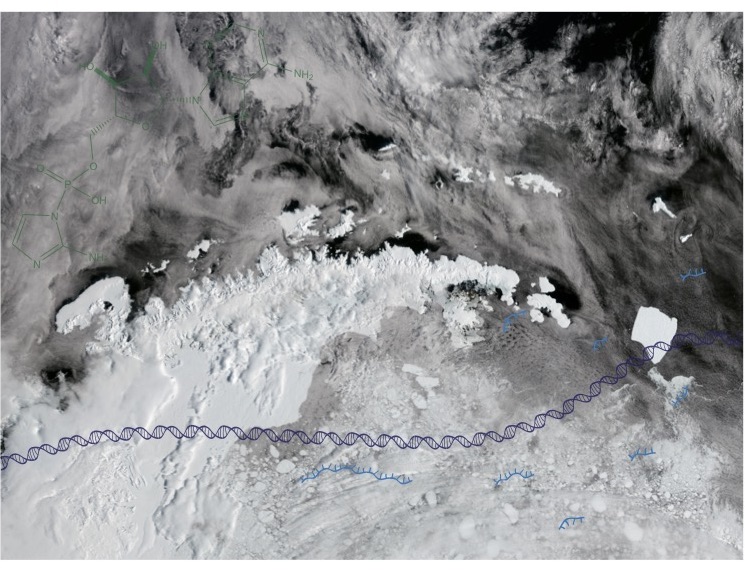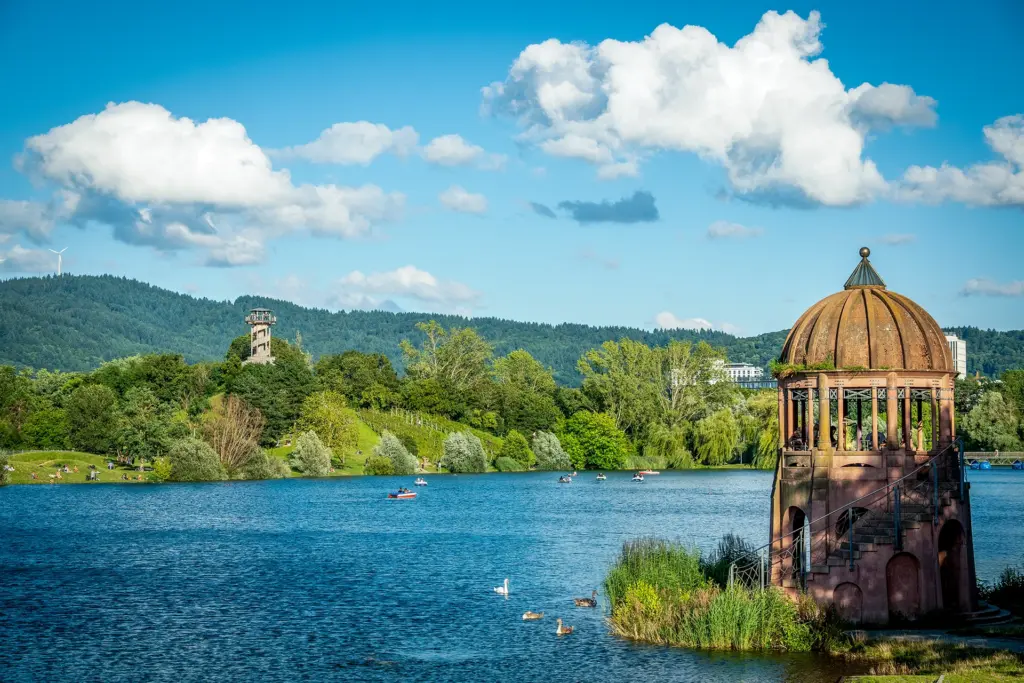Creative Writing on the Origin of Life
Where do we come from? How did life start? Daniel Duzdevich is a molecular biologist researching these fundamental questions. He typically delves into this inquiry within the confines of the laboratory until he realizes that comprehending the origin of life necessitates the inclusion of language.
Daniel, you are an Assistant Research Professor in the Department of Chemistry at the University of Chicago. At your career level in the natural sciences, there is a strong tendency to specialize. Your research topic sounds like quite the opposite: you are dealing with “The Origin of Life” – a very broad research scope. How did you get here?

During my Ph.D. I specialized in DNA replication and repair in budding yeast, which is the kind of yeast used to make beer and bread (and surprisingly similar to human cells, at the molecular level). It was very exciting. The politics of contemporary science and the structure of research institutes dictate that the way to advance your career is to be the best at one very specific thing. But I did not want to get stuck in a narrow path, so for the next step I decided to pick something that would really captivate me. Around the time I was finishing my Ph.D., the Kepler Exoplanet Mission was discovering exoplanets at an extraordinarily high rate. This was a big deal, because we had only realized that there are planets around other stars maybe 10 or 15 years before. And now suddenly there were hundreds and after a while thousands, because this Kepler space telescope was finding them every day. There was a renewed interest in in astrobiology, the study of whether or not there’s life elsewhere in the universe, because we now had the opportunity to actually start observing planets outside the solar system. Then there was a kind of trickle-down excitement around exploring the origin of life, because there can’t be life on any planet unless it somehow first started there. I was very interested in studying how life may have emerged on Earth by using experiments, and I already had an interest in evolution.
How does research on the origin of life proceed?
It depends on the perspective of the researcher. For example, astrophysicists and geochemists can try to understand what materials were available in earlier cosmic periods. They can consider how planetary systems form around their host stars, or they can study what meteorites are made of, because some of them are time capsules of stuff that formed our solar system. Others take a theoretical approach and use computer models to examine how information might propagate. Molecular biologists like me prefer an experimental approach. I’m interested in how primitive molecules, which could have been precursors to biological molecules, interact in ways that resemble life-like processes. We prepare and mix these molecules in the laboratory, observing their behaviors. This provides valuable insights into how life may have started, but it’s important to acknowledge the assumptions and variables involved, which are subject to criticism and reinterpretation.
Your FRIAS-project Midnight in the Laboratory is taking another direction. You ask: “What does it feel like to imagine and perform experiments about how life began?” This sounds like you are changing the scope: from material that can be seen under the microscope to the subject who looks into the microscope. Or put differently, you are switching the perspective from the natural sciences to the Humanities. What is your motivation for this?
I think that captures my project really well. I believe very strongly that the Humanities should play a much bigger role in basic research science: in how it is conducted, how the people who work on it are educated, and how they communicate what they do. This is almost completely absent. We communicate science through language. The way that language functions to convey knowledge, but also to constrain knowledge, is extremely relevant for the natural sciences. Sometimes, natural scientists will say that the language of science is mathematics, and I can see an argument for this. But, when I go to a conference, I don’t throw up data tables in my presentation. I throw up visuals and I write research articles and I speak to my colleagues. So on the face of it, objectively, everything is being molded by our language. And I do not find that there is even an awareness of this among scientists. And I think that there can be a lot to learn, because so much of what we do in the laboratory, for example, when we formulate a hypothesis, will be affected by the words that we use and the ways in which we mold those words and the ways that we speak to each other about these ideas versus how we write about them.

How are you going to approach this lag in the significance of language around research on the origins of life in your project?
I am working on a collection of essays using the tools of creative nonfiction writing, so I don’t have to abide by the rules of science. It’s sort of the opposite of what I typically do in the laboratory. I’m allowing myself complete creative freedom to play with the language and indulge in it in a way, which is a lot of fun and very satisfying. There’s a long tradition of science inspiring creative work in art and in poetry and in writing. So in that respect, it’s not new. I think, maybe the part of it that might be somewhat unusual is that it’s a scientist who wants to do it.
The topic of the origin of life seems to be a good field for this approach, because it raises so many associations.
“Origin of life” is the scientific version of “Where did we come from and why are we here?” I think most people get excited about it. It encompasses a lot of topics that are not scientific. So it encompasses issues related to human perspective. What does the passage of time mean when we’re thinking about the history of the planet versus the molecules that started the origin of life? What does it mean that we as humans are products of the origin of life? We are studying it, but it happened four billion years ago. These are the types of little notes that I take, and I am developing these into my series of essays. I will pick one or two of these questions or topics, and then try to place them somewhere in this history that goes from the formation of the planet, the start of life, the history of life on Earth, and then humans studying it. And then also thinking about the future of life on Earth in the absence of humans. So I’ll place it somewhere in that trajectory, and then use creative language and almost a kind of poetic style.
You have been at FRIAS as a Marie S. Curie Fellow for more than six months now. How has your research stay here felt like so far?
What’s remarkable about FRIAS is the interdisciplinary environment it fosters. I’ve always had deep and significant interests beyond my own field, but often found it challenging to engage with researchers outside my department in other university settings. Here at FRIAS the atmosphere is different. It embodies what I believe a university should be: a place where scholars from diverse disciplines converge and collaborate. Interacting with philosophers, historians, writers, and academics from various fields has been tremendously enriching. The cross-pollination of ideas has not only broadened my knowledge but also inspired and stimulated my own work. Despite apparent differences in our research topics, the shared pursuit of knowledge and problem-solving leads to meaningful exchanges that benefit all of us, collectively. This intellectual exchange and the camaraderie among fellows makes my experience at FRIAS truly exceptional. It’s intellectually stimulating, exciting, and immensely enjoyable.
(The text is condensed from an in-person recorded interview.)

About Daniel Duzdevich
Dr. Daniel Duzdevich studied Biophysics and Biology at Columbia University and Churchill College, Cambridge. In 2016, he completed his Ph.D. in Biological Sciences at Columbia, focusing on visualizing DNA replication at the molecular level. As a Postdoctoral Researcher, he joined Jack W. Szostak’s laboratory at the Harvard University Origins of Life Initiative. He moved with the laboratory to the University of Chicago, where he has been an Assistant Research Professor in the Department of Chemistry since 2023. Currently, Daniel Duzdevich utilizes experimental molecular biology tools to investigate the emergence of life on early Earth. Additionally, he has been engaged in several astrobiology projects. From September 2023 to August 2024, he holds an External Junior Fellowship at FRIAS within the framework of the Marie S. Curie FCFP funding program.
The interview was conducted by Dr. Max Bolze, publication on 08.04.2024
Media





